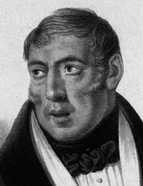

After the Liberal Revolution, he was elected a deputy to the Extraordinary and Constituent General Courts, having chaired the plenary sessions five times. He left Lisbon because of the Vilafrancada but returned later to take part in the conception of the Charter of Fundamental Law — later known as the Constitutional Charter — promised by King João VI and never granted. In 1824 he married his eldest niece, Mariana José Trigoso (1807-1834), the daughter of his brother Sebastião Francisco Mendo Trigoso Pereira Homem de Magalhães (1773-1821).
He was proposed for the position of Minister and Secretary of State for the Affairs of the Kingdom (1826) by Regent Queen Isabel Maria (1801-1874), and later appointed permanent Councillor of State, a government role he held between 1 August and 6 December 1826. With the rise to power of King Miguel, he decided to withdraw from politics, only to return in July 1833 with the final victory of the liberal army.
In 1834, after the liberal regime was established, he was appointed a Peer of the Realm and quickly rose to vice-president of the House of Peers of the Realm. He held this position until his sudden death in Lisbon on 11 December 1838, at the age of 61. He was publicly honoured by Francisco de Almeida Portugal (1797-1870), the Second Count of Lavradio and a close friend of the author: "No one will dare to say today that the services that Mr Trigoso rendered to his country were not many and of great value, even though he never received the slightest reward (...). We should add that he didn't need to refuse any honours, since none was ever offered. The weight of his virtues and merit was far too great to be honoured by those who were lacking in these qualities. This is yet another example of Portuguese ingratitude, so often seen since the reign of the ungrateful King Manuel. However, now that Mr Trigoso is no more, we hope that everyone will do justice to his memory and recognise him as one of the most distinguished scholars of the nation, one of the most eloquent speakers of our Parliament, a man of the state, both honest and enlightened, alas one of the most virtuous citizens of our times " Apontamentos para o Elogio Histórico… [Notes for the Historical Eulogy...], 1840, pp. 33-34).
This work is financed by national funds through FCT - Foundation for Science and Technology, I.P, in the scope of the projects UIDB/04311/2020 and UIDP/04311/2020.
